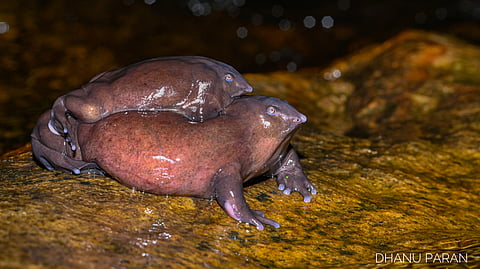

CHENNAI: Most of the conservation work revolves around keystone species like tigers and elephants, while some of the 'less-known' species silently perish. To address this, the Tamil Nadu government on Monday created a dedicated "Tamil Nadu Endangered Species Conservation Fund", which will be a rolling pool with a corpus of Rs 50 crore, to recover some of the biodiversity that is on the verge of extinction.
In the budget, Finance Minister Thangam Thennarasu said the fund will be constituted with State's contribution of Rs 5 crore in the first phase, along with funding support from other government entities, CSR grants, besides national and international funds. "This fund will help in formulation of new schemes for protecting endangered and critically endangered species."
Way back in 2011, Union Ministry of Environment and Forests gazette notified a list of 23 plant and 16 animal species that are on verge of extinction in Tamil Nadu.
The ministry even prohibited collection of samples from these notified species without the approval of Tamil Nadu State Biodiversity Board for scientific research or otherwise. It has asked the Board to undertake studies and propagate in situ and ex situ conservation and rehabilitation.
However, in these last 13 years, not much of work is done to revive these notified endangered species, many of whom are endemic to western ghats of Tamil Nadu and Kerala.
Supriya Sahu, Additional Chief Secretary, Environment, Forests Climate Change Department, told TNIE, "For instance, there are a bunch a frog species that endemic to Anamalai landscape, which are critically endangered. We hardly know anything about their distribution, population and breeding cycle to undertake management measures. Nilgiris wart frog, White-spotted bush frog, Anamalai flying frog, Blue frog are all in our priority list for which a species-specific recovery programme will be designed and it will be time bound under the new fund, which is a first-of-its-kind in the country."
Likewise, a lot of attention is needed for the conservation of pangolins, a Schedule 1 animal and the world's highest-trafficked species and Tamil Nadu is ranked fifth in the country. A total of 125 pangolins were reportedly killed and trafficked between 2018 and 2022, as per the latest analysis of TRAFFIC and WWF-India.
"But, there is population estimation done so far. We don't know how fast the numbers are going done. There is a species called Nilgiri marten, only around 1000 individuals are left in the wild," Sahu said and added that there are lot plant species that are under stress.
Vivek Saxena, Deputy Director General of Union environmental ministry and former country representative of International Union for Conservation of Nature (IUCN), told TNIE the each and every species in the nature has an important role to play. "We know more about some species and know less about others. The nature's equilibrium can be maintained only when species diversity remains intact."
Lesser-known endangered & endemic species to Tamil Nadu & Western Ghats region
1. Salim Ali's fruit bat
2. Malabar Civet
3. White-rumped vulture
4. Hawksbill sea turtle
5. Nilgiris wart frog
6. White-spotted bush frog
7. Anamalai flying frog
8. Knifetooth saw fish
9. Longcomb sawfish
Other budget announcements:
1. TN-SHORE has been sanctioned at an estimated cost of Rs1,675 cr.
2. The Mission aims to restore coastal resources across 14 coastal districts of Tamil Nadu covering a stretch of 1,076 km.
3. Enhancement of coastal biodiversity, coastal protection, improving livelihoods of coastal communities and pollution control in coastal areas are the four major aims of this mission.
4. This initiative will capitalise on the potential of the Blue Economy and will primarily focus on the restoration of mangroves, coral reefs, and salt marshes.
5. Works for conserving mangroves and reviving coral reefs at Kariyachalli islands in the Gulf of Mannar will be undertaken.
6. Additionally, works are underway to establish a sprawling botanical garden in Kadambur, Chengalpattu, spanning 137 acres, at a cost of Rs 345 crore, in collaboration with London Kew Gardens.
7. Sea turtle conservation centres will be established at Nagapattinam and Chennai, along with an International Dugong conservation centre at Manora in Thanjavur District.
8. Rs 40 cr for Ennore rejuvenation.
9. Rs 250 cr for blue flag certification for beaches in Chenna, Ramanathapuram, Thoothukudi, Tirunelveli, Nagapattinam, Pudukottai, Cuddalore and Villupuram.